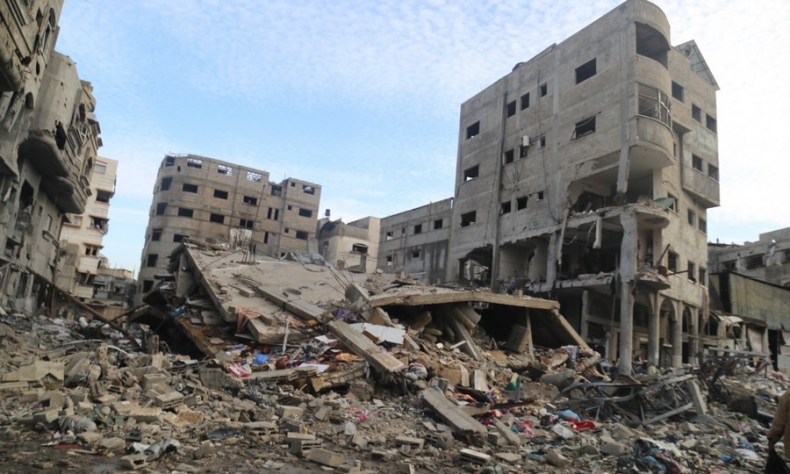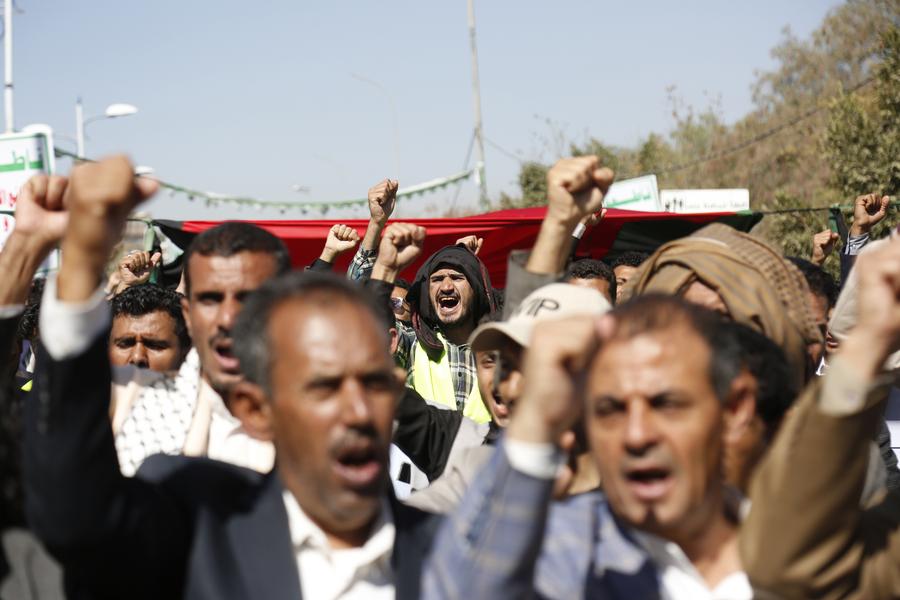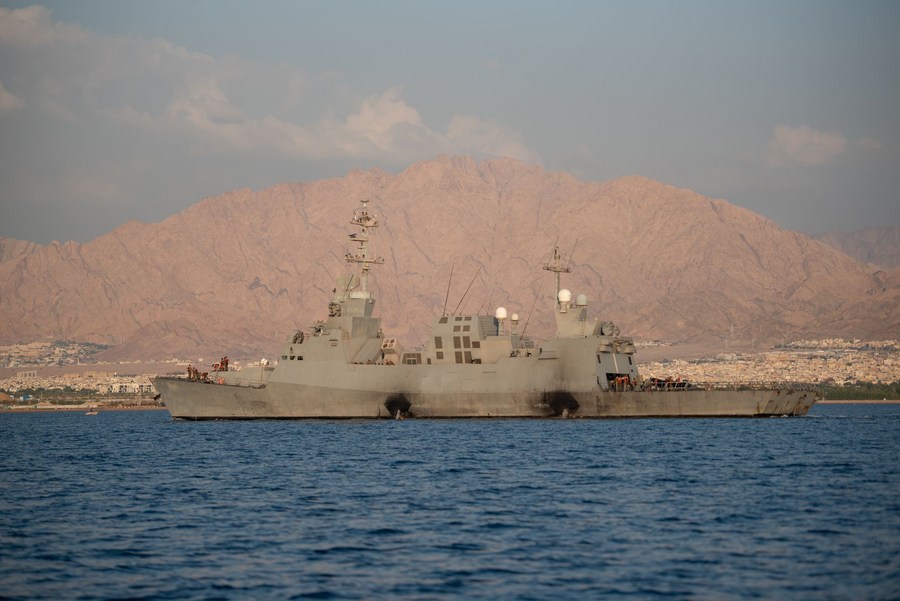Red Sea Tensions During Israeli-Palestinian Conflict and the Solution

The issues in the Red Sea region and their impact on international shipping are just one of the spillover points of the Israeli-Palestinian conflict.
Since the escalation of Israeli-Palestinian tensions into violent conflict last October, the Red Sea has become a turbulent chessboard of geopolitical conflict. In a bold demonstration of solidarity with Palestine, Yemen’s Houthi militant group has intensified the stakes by targeting vessels with links to Israel or those heading to Israeli ports.
From January 12 to 18, the U.S. and the UK conducted four rounds of strikes against Houthi targets in Yemen, while on January 17 the Houthis claimed a missile attack on a U.S. ship in the Gulf of Aden in support of Palestinian people and in response to “the U.S. and British aggression” against Yemen.
“Our forces will not hesitate to target all sources of threat in the Arabian Sea and the Red Sea within our legitimate right to defend Yemen and to continue supporting the oppressed Palestinian people,” Houthi military spokesman Yahya Sarea said in a statement aired by Houthi-run al-Masirah TV.
Any new assault from the United States and Britain “will not go without response and punishment,” Sarea said. “Our military operations will continue until Israel ends its attacks and siege on the Palestinian enclave of the Gaza Strip.”
This statement came after the U.S. redesignated the Houthi group as a “terrorist organization” on January 17, which will officially take effect in 30 days.
The escalation highlights not only the fragility of stability in the region, but also the challenging nature of maintaining Red Sea stability through diplomacy.
Conflict spillover
The Suez Canal, which connects the Red Sea and the Mediterranean Sea, is a pivotal waterway in global commerce that commercial ships use to pass between Asian and European ports.
The canal’s significance is underlined by data from Clarksons, a shipping and offshore research and consultancy. The company’s 2022 figures show that the canal handled 45 percent of the world’s container shipping capacity, 60 percent of automobile transport vessels, and a significant share of energy carriers, for example, 9 percent of oil tankers.
However, the increasingly frequent attacks in the Red Sea have caused maritime companies to avoid traversing its waters. On December 15, 2023, Maersk, the second largest container shipping company in the world, announced the suspension of all its operations in the Red Sea and adjoining Gulf of Aden indefinitely, following attacks on two of its ships by the Houthis. This decision led to a chain reaction, with most of the large shipping companies on the Asia-Europe routes following suit. According to Alphaliner, a shipping consultancy firm, the companies now halting their Red Sea operations represent about 85 percent of the world’s container shipping capacity. Their influence is even more pronounced on the Asia-Europe routes, where they exceed 95 percent of the capacity.

“The Houthi group is a part of the Arab world. They strongly align with the Palestinian liberation movement. Their strikes in the Red Sea primarily target Israeli and American interests, reflecting their demand for an Israeli ceasefire to avert deepening humanitarian crisis. Thus, their actions can be seen as a spillover of the Israeli-Palestinian conflict,” Jin Liangxiang, a senior research fellow with the Center for West Asian and African Studies, Shanghai Institutes for International Studies, told Beijing Review.
The issues in the Red Sea region and their impact on international shipping are just one of the spillover points of the Israeli-Palestinian conflict. The situation has triggered a series of military engagements, marked by assassinations and bombings. A poignant example is the tragic incident in Kerman, Iran, on January 3, where two explosions led to 92 fatalities. These events have significantly escalated regional tensions, with the frequent skirmishes along the Lebanon-Israel border, and in Iraq and Syria, further fueling worries about the conflict’s potential to further spread from the Gaza Strip.
Root of turmoil
In a January 10 update from the Gaza Strip, the Palestinian health department disclosed a grim tally underscoring the severity of the situation: Over 23,300 lives lost since the resurgence of hostilities in the Israeli-Palestinian conflict.
Adding to the regional turmoil, the U.S. and British militaries launched powerful airstrikes on Sanaa, Yemen’s capital. The strikes occurred notably soon after the conclusion of U.S. Secretary of State Antony Blinken’s fourth Middle Eastern diplomatic mission in under three months.
According to a U.S. Government press release, Qatar’s Emir Tamim and Saudi Crown Prince Mohammed bin Salman urgently implored Blinken to actively pursue a ceasefire in Gaza. Yet the absence of a decisive response from Blinken in the face of these earnest requests has led to a noticeable atmosphere of disappointment and unease.
According to Jin, following the beginning of the Gaza crisis, emerging humanitarian concerns have been testing the resilience of U.S. human rights diplomacy. These issues have not only complexified the situation, but also drawn substantial moral and political scrutiny. “American policy, entangled in its own domestic politics and influenced by lobbying from pro-Israel groups, faces a dilemma. This complexity hampers its ability to impose punitive measures on Israel,” Jin said.
Abdulaziz Aluwaisheg, a political analyst from Saudi Arabia, who is assistant secretary general for political affairs and negotiation for the Gulf Cooperation Council, pointed out that Washington needs to acknowledge its diminished exclusivity as a foreign influencer in the region, and that relying solely on Israel is insufficient for safeguarding its interests, according to a Xinhua News Agency report.

The moral force
During a regular press conference of the Ministry of Foreign Affairs of China on January 12, a Bloomberg reporter raised a question involving Chinese vessels on the Red Sea. These ships have reportedly modified their Automatic Identification System (AIS) transponders, which usually indicate destination and cargo, to now identify themselves as “Chinese ships.” This shift has sparked intrigue over whether it reflects a directive from the Chinese Government or an autonomous decision by the shipping companies.
In response, Mao Ning, a spokesperson for the Foreign Ministry, acknowledged she had noted relevant reports but had no specific information. She pointed out that such actions highlight the urgency of deescalating tensions in the Red Sea and underscore the paramount importance of safeguarding international shipping routes.
Arnaud Bertrand, an influential entrepreneur and commentator on the social media platform X, reacted to this trend on January 13. He humorously noted the irony of ships highlighting their Chinese links to prevent attacks, suggesting that peaceful conduct, rather than militarism, enhances security.
The phrase “all Chinese crew” is more than a label; it reflects China’s proactive approach in supporting escorting, peacekeeping, and humanitarian missions in Africa and West Asia, said Jin.
China’s influence in the Red Sea is not militaristic. The Chinese Navy has been pivotal in safeguarding over 7,000 ships from many nations since 2008. Its efforts include significant interventions, like rescuing a Saudi oil tanker from Houthi forces in 2017, a move that garnered international commendation.
According to Jin, China’s involvement extends beyond security. The Belt and Road Initiative illustrates its dedication to building infrastructural and economic bridges in Red Sea nations, encompassing ports, railways and power stations. These projects are not just about construction but also about fostering job creation and opportunities.
Furthermore, China advocates peace and stability in the region. Take Yemen for example. China has been dispatching medical teams to the country since 1966, a testament to a longstanding humanitarian commitment that has significantly impacted healthcare development in the region. In addition, China’s pushing for dialogue over conflict has been a lifeline during crises, Jin added.
“In the United Nations Security Council, China has repeatedly submitted resolutions concerning the Israeli-Palestinian issue. It has been making efforts to support the just and reasonable demands of the Palestinian people and to support the peace process in the Middle East,” Jin said.
 Facebook
Facebook
 Twitter
Twitter
 Linkedin
Linkedin
 Google +
Google +










